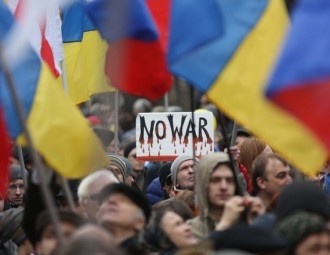Uladzimir Matskevich: The partakers of the Peace March live among 85% of Russians who support Putin

The situation and the conditions in which people carry on their protests against the Putin’s regime is much more demonstrative than the change in the number of participants of “peace marches”.
Russians are protesting against war against Ukraine. On September 21 from 20 to 50 thousand people took part in the “Peace March” in Moscow. Is it a lot of people or too few people for a ten-million Moscow? How ill is Russian society? Do we really observe the crash of the Putin’s Russia?
Uladzimir Matskevich, the head of the Board of the International Consortium “EuroBelarus”, answered the questions of the “EuroBelarus” Information Service.
- From 20 to 50 thousand people took part in the “Peace March” in Moscow. Is it a lot of or too few people for a ten-million Moscow? Are these figures enough to diagnose the Russian society?
- According to the situation in today’s Russia, the number of people participating in the antimilitary demonstrations, especially according to some estimation of 50 thousand people, looks quite impressive.
Moreover, a “Peace March” also took place in St. Petersburg, while in Novosibirsk a similar demonstration was disrupted by provocateurs and police.
It means that free critical thinking is able to oppose total propaganda and zombification by the media.
- And still, according to the information provided by the media, in comparison with March the number of active participants of the antimilitary protests in Moscow decreased by fifty per cent. What is the reason for that? According to the social poll conducted by the “Public opinion” foundation, in August 95% of Russians was against the introduction of Russian army into Ukraine.
- I wouldn’t compare the number of people on September 21 and six months ago; situation and conditions in which people go to demonstration are much more important.
I’m sure that most partakers of the Peace March constantly live among 85% of Russians who support Putin. A war party with the headquarters in Kremlin would find support among very little part of Russians. Russians don’t want war, they don’t believe propaganda and media. Official Russian media say that Russia doesn’t lead a war; it is helping Donbas. It is thanks to propaganda that such depressively large number of people supports Putin.
These figures demonstrate the support of the deceived Russians: it is help, not war.
If we look through Russian official papers, watch Russian TV-channels, we wouldn’t see the war between Russia and Ukraine, but would see a civil war in Ukraine. All centrist Russia media are bound to produce total zombification and lies.
There are no alternative sources of information, and thanks to the Russian propaganda, Western media in English are perceived as Russophobia.
- The latest “Peace March” looks much alike Kiev events six months ago: the same “bodybuilders”, provocateurs, who pour out their aggression onto the people around them, and the police that at times is uniting with the provocateurs so that to avoid antimilitary demonstrations. Is the situation repeating?
- It is well-developed technologies of contracting mass demonstrations. Any mass demonstration is a positive event until it ends in clashes, which are mostly provoked by the special services. And the police immediately win the sympathy of most people. Special services regularly employ their well-developed technologies.
- Many experts foretell self-destruction and ruin of Russia. Don’t you find these forecast too apocalyptic?
- I don’t, as I share the same opinion – in a certain sense, we see Russia’s agony. The other thing is that I wouldn’t make such forecasts with reference to certain dates. Putin will inevitably lose the war; and any war is always connected with the popularity of the government. Crash is but a natural end of the Putin’s regime.
But when it happens and how long will Kremlin hold, is another question. As long as the war in Ukraine lasts, the Putin’s regime will last as well. But as soon as the war ends, Russians will recall the economic problems everyone forgets about during the war and ask: whose fault is that? It will bring huge problems for the Putin’s regime.
And after that everything will depend on whether opposition finds enough power and possibilities to take the situation under its control.
-
03.01
-
07.10
-
22.09
-
17.08
-
12.08
-
30.09








































